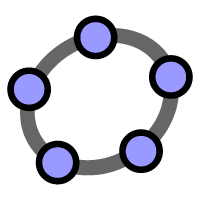About
Objectives
The project meets a demand from one of the research lines of the Postgraduate Studies Program in Mathematics Education, Information Technologies and Mathematics Education in the context of the proponent's research group: Technologies and Means of Expression in Mathematics-TECMEM and has as proposal to offer basic school teachers, preferably from public schools, training for their work in the context of remote teaching using the GeoGebra software not only as another technological resource, but as a resource that collaborates in the development of teaching practice, involving mathematical concepts and automatic evaluation methods. Research will also be carried out at the Instituto GeoGebra de Portugal - IGP, namely in support of training that is given at various levels and with the partnerships that the IGP has already established in Portuguese-speaking African countries, and will be an added value for deepening the research conducted into development training programs. Thus, this research aims to contribute to the insertion of technology in teaching practice, improving studies and analyzes regarding technology in the context of mathematics education. Considering GeoGebra as an instrument for teacher practice is important, because in this interaction the reorganization and modification of the software's usage schemes occur, facts that allow the structuring of the teacher's action, contributing to their formation and improvement of mathematical concepts. With technological changes in teaching, currently requiring remote teaching in schools, it is also interesting to study how resources for mathematics teachers' work can adapt to their teaching practice in this context. Therefore, in this research project, the use of GeoGebra in the creation of resources, by teachers, for teaching mathematics in different aspects will be studied: adapting or creating materials, adjusted to the interests, needs and problems that teachers face in schools , investigating the use of these materials in school contexts and their effect on improving student results and creating possibilities for immediate feedback on their assessment proposals.
Activities - Summary (May 11, 2021)
The project is still ongoing with two groups. Training and action research work is being carried out in these groups, as reported below. The activities have been the subject of reflection by the coordination team that includes the two proponents and the professor. Dr. Márcio Vieira de Almeida as researcher and collaborative participant in the activities developed.
At the beginning of the work, a group was formed, which we called Group I, integrating 9 teachers from the Federal Institute of Alagoas – IFA, characterized as a pilot group, allowing an improvement in the design of activities to support the
GroupII activities. Group II includes teachers from different institutions: from Angola (1), Brazil (4), Cape Verde (2) and Portugal (5), for a total of 12 teachers. The respective Free and Informed Consent Terms were sent and returned to each group and each participant, taking into account the inherent Ethical issues.
To date, 7 meetings have been held in Group I from 12/16/2020 and in 2021 on 01/20; 09/02; 02/03; 03/16; 03/30;
04/20; all via the Google Meet platform. In Group II, activities began in 2021 and 3 meetings have been held so far on 03/18; 04/15 and 05/20 via the ZOOM platform.
Considering the period proposed in the project for its development from 03/01/2021 to 08/30/2022, we concluded that a lot still needs to be done and worked on. However, important previous results are being obtained.
Methodological Steps
In the meetings held so far with the two Groups, work proposals are sent and, as a result, several innovative and original task proposals with automatic feedback are being obtained, of which
Previous versions have been prepared and will be improved with a view to integrating an electronic book. These activities are shared in two different spaces on the GeoGebra Groups platform (https://www.geogebra.org/) in which participants insert their proposals and others interact and share their suggestions for improvement. The activities, as they are built in GeoGebra, allow interaction and movements and thus it is possible to improve them with each access.As theoretical support, references were sent on automatic feedback in the context of the project. These references were translated from English by a professional team and sent to participants for prior discussion at the meetings. Such actions were necessary due to the language difficulties of some participants and also to speed up knowledge of the need for theoretical bases for building the activities.
Items being developed: work in progress is being produced




